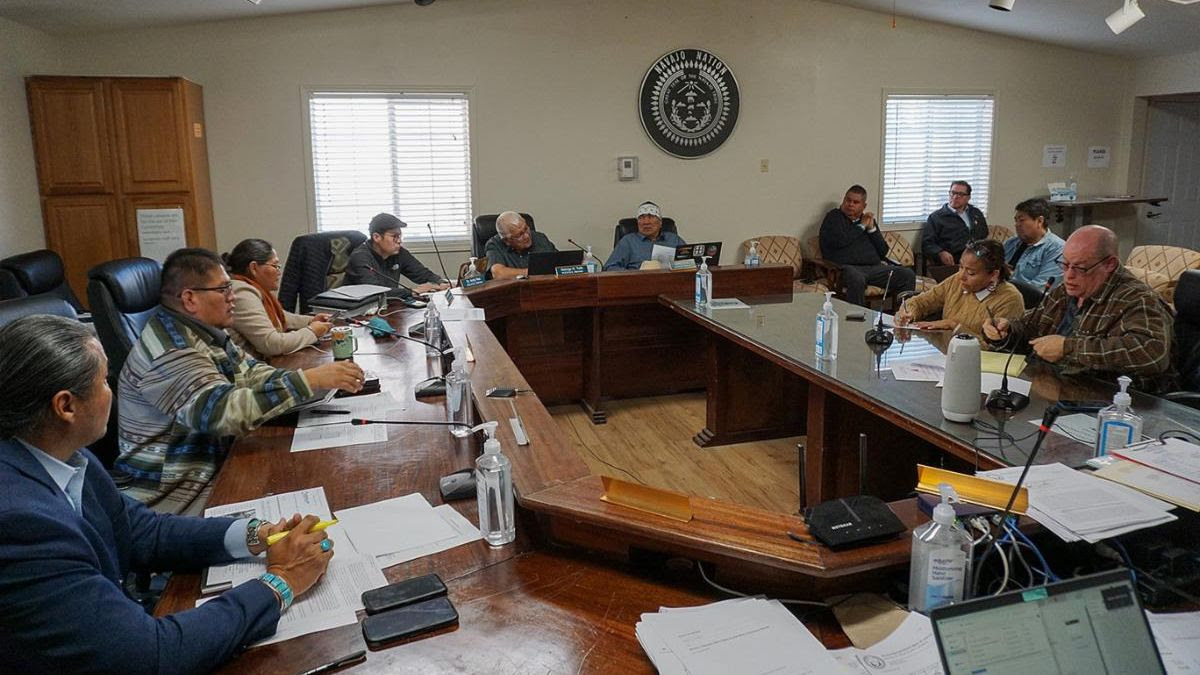
- Details
- By Native News Online Staff
On Wednesday, the Health, Education, and Human Services Committee convened a special session to review a report from the Navajo Nation Department of Justice concerning a recent memorandum from the U.S. Department of Education. This memorandum outlines the Department’s interpretation of Title VI of the Civil Rights Act of 1964 and the Equal Protection Clause of the U.S. Constitution, and it explains their effects on anti-discrimination policies.
In a letter dated February 14, Acting Assistant Secretary for Civil Rights Craig Trainor warned that the U.S. Department of Education “will no longer tolerate the overt and covert racial discrimination that has become widespread in this Nation’s educational institutions,” explicitly mentioning diversity, equity, and inclusion programs. The letter further specifies that this interpretation applies to every educational institution—from preschool through postsecondary levels—as well as to state educational agencies that receive federal funding.
Last week, Speaker Crystalyne Curley and HEHSC Chair Vince James issued a memo urging the Navajo Nation Department of Justice, the Department of Diné Education, and other relevant entities to present their analysis and recommendations to the HEHSC in response to the February 14 letter.
"We understand that the letter issued by the U.S. Department of Education is very concerning and brings about many questions from educational institutions on and off the Navajo Nation, so it is important that we bring everyone to the table so that we have a unified stance in response to the federal government,” said HEHSC Chair Vince James. “Their interpretation of the Civil Rights Act appears to contradict many longstanding interpretations.”
A written response from the Department of Diné Education asserts that the U.S. Department of Education “misinterprets the language of the Civil Rights Act of 1964.”
Navajo Nation Acting Attorney General Heather Clah then presented the committee with a memorandum emphasizing that the Navajo Nation’s relationship with the federal government is not based on race, color, or national origin, but is instead a government-to-government relationship defined by political classification and upheld by trust and treaty obligations.
The NNDOJ memorandum clarifies that educational programs serving Navajo students are not organized by race, color, or national origin. It warns that any actions undermining these programs—rooted in trust and treaty obligations—would erode tribal sovereignty and the unique legal relationship between Indian tribes and the U.S. government.
Additionally, the memorandum discussed how adjustments in admission practices, educational programming, and standardized testing might be used by institutions to avoid potential retaliation from the Department of Education.
During the discussion, Council Delegate Dr. Andy Nez raised concerns about the impact on Navajo students attending colleges and universities off the Nation, as well as on Navajo employees living elsewhere. He recommended that the Nation address these issues in any dialogue or consultation with the federal government regarding the White House’s Executive Orders.
The committee plans to work with NNDOJ to draft a response letter to the U.S. Department of Education by February 28.
More Stories Like This
Bard College Center for Indigenous Studies (CfIS) Hosts Annual Symposium With Keynote Speaker Miranda Belarde-Lewis on March 9–10American Indian College Fund Announces Spring 2026 Faculty Fellow Cohort
Navajo Nation Signs $19 Million Diné Higher Education Grant Fund Act into Law
Dr. Shelly C. Lowe to Be Inaugurated as IAIA President March 26–27
Tlingit Language Courses Expand for Students to Learn With Families At-Home
Help us defend tribal sovereignty.
At Native News Online, our mission is rooted in telling the stories that strengthen sovereignty and uplift Indigenous voices — not just at year’s end, but every single day.
Because of your generosity last year, we were able to keep our reporters on the ground in tribal communities, at national gatherings and in the halls of Congress — covering the issues that matter most to Indian Country: sovereignty, culture, education, health and economic opportunity.
That support sustained us through a tough year in 2025. Now, as we look to the year ahead, we need your help right now to ensure warrior journalism remains strong — reporting that defends tribal sovereignty, amplifies Native truth, and holds power accountable.
 The stakes couldn't be higher. Your support keeps Native voices heard, Native stories told and Native sovereignty defended.
The stakes couldn't be higher. Your support keeps Native voices heard, Native stories told and Native sovereignty defended.
Stand with Warrior Journalism today.
Levi Rickert (Potawatomi), Editor & Publisher


